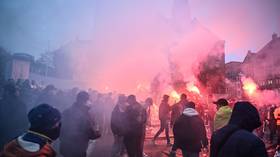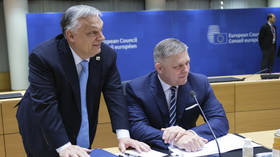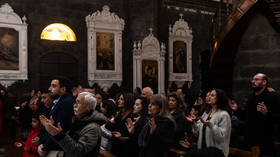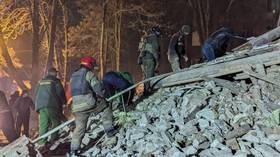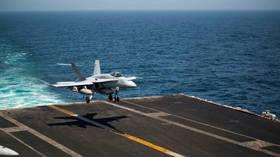100,000 people displaced by fighting in Raqqa, Syria, since April – UN
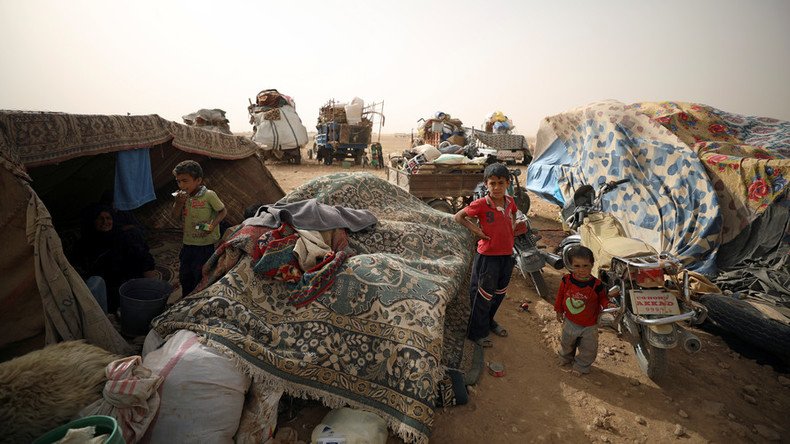
Some 100,000 people have been displaced due to heavy fighting near the Islamic State stronghold of Raqqa, Syria, since April, the UN says. Children are the worst hit, with many subjected to torture, sexual violence and executions.
“We need to see a step-change in access to the increasingly dire situation in northeastern Syria…With some 100,000 people displaced due to fighting around Raqqa since April, access is needed now through every possible modality,” Under-Secretary-General for Humanitarian Affairs and Emergency Relief Coordinator Stephen O’Brien said in a statement to the UN Security Council on Syria on Tuesday.
According to O’Brien, the protection space is “shrinking, humanitarian conditions are worsening, and the level of despair is rising” across the entire country. In Idlib alone, there are over 900,000 displaced people, he said.
READ MORE: US begins arming Kurdish militia fighting ISIS near Raqqa
This is “not due to insecurity or poor infrastructure, but by increasingly strict limitations by local authorities, non-state-armed groups, as well as terrorist organizations, and the actions of some neighboring countries.”
The city of Raqqa, some 40km from Tabqa Dam, Syria’s largest reservoir, was captured by Islamic State (IS, formerly ISIS/ISIL) back in 2013. Since then the city has been a scene of heavy battles and numerous offensives.
My full remarks to the UNSC on #Syria today: https://t.co/7vgvVrvtEDpic.twitter.com/jTisqaPnLr
— Stephen O'Brien (@UNReliefChief) May 30, 2017
Clashes and airstrikes have recently intensified near the city as US-backed Syrian rebels reached the northern entrance of Raqqa, AP reported on Tuesday, citing activists.
Airstrikes in mid-May killed nearly two dozen farmworkers in a village in eastern Raqqa, the UN’s high commissioner for human rights, Zeid Ra’ad al-Hussein, said earlier in May.
Hussein called on all forces operating in Syria to be more careful to correctly distinguish between legitimate military targets and civilians.
READ MORE: Safe zones in Syria come into force: Here’s what we know about
In the meantime, O’Brien praised efforts of Iran, Russia and Turkey which established a memorandum on the creation of four de-escalation zones which came into force earlier in May.
This “memorandum that stipulates, in no uncertain terms, that fighting must significantly decrease and unhindered humanitarian access be enabled to these four areas,” he said.
‘Children tortured, subjected to sexual violence & executed’
Children remain the worst-affected group of population amid Syrian crisis, O’Brien said, adding that some 7 million children are now living in poverty in the war-torn country.
“Tens of thousands of children have been killed, and for those who have survived till today, the outlook remains bleak,” he said.
What future does a country have when its next generation is a lost generation? #Syria#UNSC
— Stephen O'Brien (@UNReliefChief) May 30, 2017
According to O’Brien, Syrian children “have been forcibly detained, they have been tortured, subjected to sexual violence, forcibly recruited and in some cases executed.”
He reminded that outside the country, Syrian children are “left to face an uncertain and traumatic future on their own”.
“They have become stateless, abandoned by the world,” he said.
“How are these children meant to function as adults? What future do these children have – illiterate, orphaned, starved, traumatized and maimed?” O’Brien said in an emotional plea to the UNSC.
“What future does a country have when its next generation is a lost generation? For these suffering children, what’s at stake isn’t politics. It’s their lives and their futures. It is their innocent voices, their suffering that need advocating,” he added.




